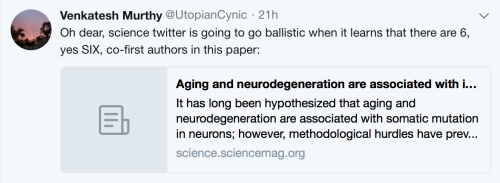A discussion today with a student asking about the use of the Royal “we” in a report about his work. I agree, this is wrong. My suggestions were the first person singular and the passive. The passive gets a bad press in places, but it does work; the repetition of “we” or “I” grates, the latter particularly so because it can convey a strong sense of ego. Though as I pointed out, this depends how it is used. It was common in single author papers for the author to use “I”. The practice has disappeared due to multiauthorship and the urge to make scientific observations look objective. We finished by joking about the feudalism implicit in the use of ‘my laboratory’, as if this was some sort of sentient being, and then I wondered out loud whether one might not, in a multiauthor paper state:
“In experiment X (Fig. X), blogs demonstrated that….” And then later “In experiment Y (fig. Y) Doe indicated….”
Tonight a tweet from @UtopianCynic

reminded me of my earlier conversation. Indeed, why bother with all the rubbish associated with authorship position? Why not have a list of authors and in the paper report who did what and who thought what?
It would then be clear (i) who pulled together the original hypothesis; (ii) who did the experiments; (iii) who thought up the interpretations of the data.
I think I might try this out.
This also solves the long-standing problem of blaming whoever is at the bottom of the pile when a paper is found to have manipulated data. Someone will be explicitly on watch and someone else will have done a particular measurement under that person’s watch.
It will be obvious who should walk the plank, and reaching for lawyers will only result in keel hauling, because it will be all written down and signed off.
You must be logged in to post a comment.